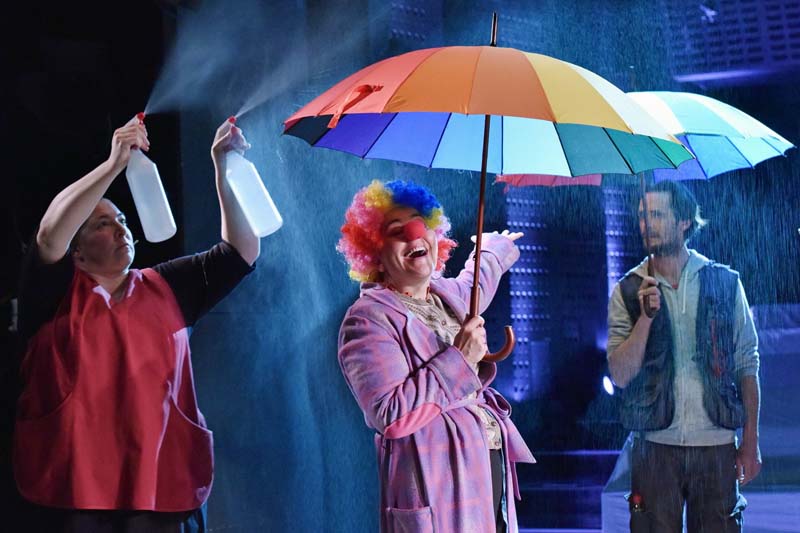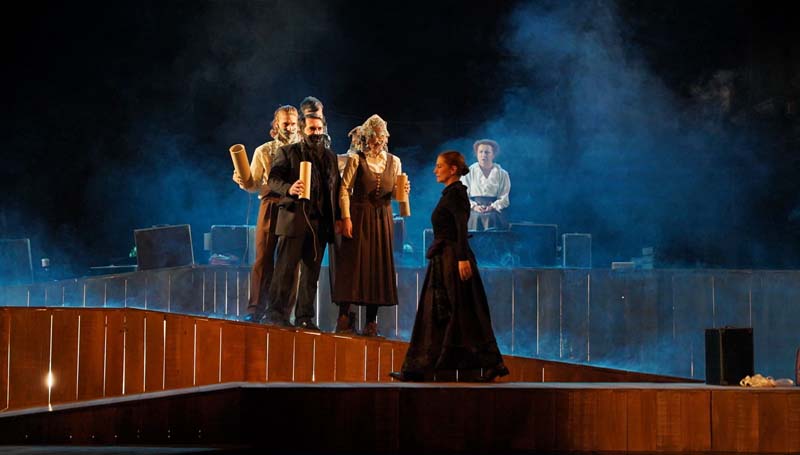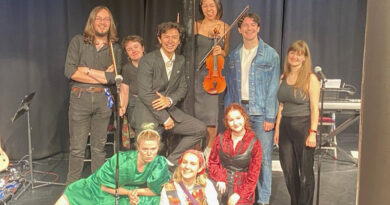Sterijino pozorje Theatre Festival: 26 May – 3 June, 2023
Sasho Ognenovski reports on the sixty-eighth incarnation of this major theatre festival in Novi Sad, Serbia.
This year’s festival raised many questions and left us with just as many dilemmas. Its programme, more precisely the competitive part that award judge Milivoje Mlađenović entitled “Humanity – risings and downfalls”, dealt with the eternal battle of human beings to preserve their identity, spiritual values and commitment to life goals.
The issues that this festival has brought up relate mostly to questions of style. For several years in a row, the Sterijino pozorje festival has been a kind of theatrical colosseum in which non-conventional theatrical thinking can be likened to weapons. Theorists have spoken of “post-dramatic” theatre with a narrative core and, as generalized as it might sound, avant-garde poetics based on the more intangible aspects of the play. The festival is of enormous significance for this region and the competitive programme this year consisted of eight plays.

Why Are You Sleeping on the Floor?
Children, is based on the verse novel by Milena Marković. It was adapted and directed by Irena Popović Dragović and produced by Belgrade’s National Theatre.
Why Are You Sleeping on the Floor? based on the novel by Darko Cvijetić, has been adapted and directed by Kokan Mladenović and produced by multiple bodies led by the Serbian National Theatre from Novi Sad.
Deceased by Branislav Nushich was directed by Egon Savin and produced by the Montenegrin National Theatre and the Culture Centre from Tivat, Montenegro.
Yankee Rose is the work of Slobodan Obradovich and was directed by Milosh Lolich. It was produced by the Belgrade Drama Theatre.
52 Hertz is by Tijana Grumich. It was directed by Mojca Madon and produced by the Slovenian National Theatre from Nova Goritsa.
Lullaby for Aleksia Rajchich by Đorđe Kosić was directed by Jug Djordjevich in a production by the National Theatre from Belgrade, the Novi Sad Foundation – European Capital of Culture, and Sterijino pozorje itself.
Miss is based on the novel by Ivo Andrich, adapted by Vanja Ejdus and directed by Djurdja Teshich. It was produced by the National Theatre of Republika Srpska from Banja Luka.
Night Lady by Aleksandar Popović was directed by Branislav Michunovich and produced by the National Theatre from Nish.
The vision of the different directors and the colourful nature of the dramatic and theatrical forms suggests a dense and dynamic production dialogue in which the judgment of creative artists provokes debate.
Of course, there was also the international selection of plays entitled “Circles” which ran as an accompanying programme. There were three productions here.
A Night with Aleksa has a script by Marko Tomash. It was directed by Ivica Buljan and produced by the Croatian National Theatre from Mostar (BIH).
Tena – a Chronicle of the Decay of a Beauty is based on a text by Josip Kozarac which has been adapted and directed by Drazhen Ferenchina.
The Beautiful Vida is based on the play by Stasha Prah, directed by Marjan Nechak, and produced by the Koper Theatre and the Slovenian Permanent Theater from Trieste, Slovenia.
What impresses in this edition of the Sterijino pozorje (in addition to the variety of conceptual approaches) is the great acting energy and general dynamism. It was rewarding to watch the technical armoury of first-rate actors allowing them to sharpen the image of the directors. Here, through the theatrical imagery, we could look at the dark side of myth and the grey shadow of folklore agnosticism. I am thinking particularly of A Lullaby for Aleksija Rajchich. We could also take a look at the sufferings of the Bosnian War (Why Are You Sleeping on the Floor?) as well as reviving the connection of the Serbian dramatic classic with contemporary traumas (The Deceased, Miss).
The festival offered us the chance to question ourselves by exposing us to the sharp satirical language of the always contemporary Aleksdandar Popovich (Night Lady). It also prompted us to consider behavioural issues that arise from current ways of living within family structures and interpret human values through theatre. I’m thinking of 52 Hertz, Children and Yankee Rose here.

52 Herz.
It seems that this is why Mladenović connects this selection with humanity, with the humanistic convulsions that in the third decade of the twenty-first century are also like a test. In this edition, Sterijino Pozorje can boast of solid directing concepts, an extraordinary visualization of almost all the theatre productions, and of course, the emerging innovative techniques that new theatre artists bring with them and which may over time come to form another theatrical worldview.
The longstanding battle between modes of theatrical expression on this festival stage seems to have also determined the awards that half of the plays in the competition received. So, the jury consisting of Liliana Peshikan Ljustanovich, Ista Stepanov, Jure Novak, Vladimir Vencel and Ivan Medenica gave the main Sterija award to the play Lullaby for Aleksia Rajchich which also received four more Sterija awards. These awards came in the categories of best play for Đorđe Kosić, acting performance for Vanja Ejdus, music for Nevena Glushica and stage speech by Liljana Mrkich Popovich.
It is interesting that the Slovenian play 52 Hertz (which was the most radical in terms of the director’s vision) won six Sterinja awards. But the most awards (eight) were for Yankee Rose.

Yankee Rose.
Innovation and solid research seem to have been rewarded at this year’s festival. It is also apparent that the existence of both those strands in the regional theatre underlines that realism is apparent in the foundation of every theatrical movement. Speaking of movement and dynamics, we must emphasize that Serbian drama offers up multiple interpretation of subtexts and actions. This festival remained faithful to what has been a logical overall development. There were numerous accompanying events such as book promotions that took place in four parts and where many significant theatre publications were promoted. Of particular importance was the conference dedicated to Serbian dramaturgy, its contemporary encouragement and stage treatment.
Sterijino Pozorje also showed this year that it is one of the theatre giants not only in the region of the countries that remained independent after the breakup of Yugoslavia but also in terms of European parameters, speaking about the importance of the Serbian stage language and broad humanistic messages that can keep individual theatre makers engaged and committed.









